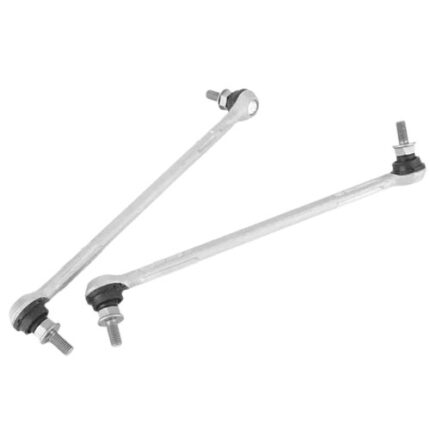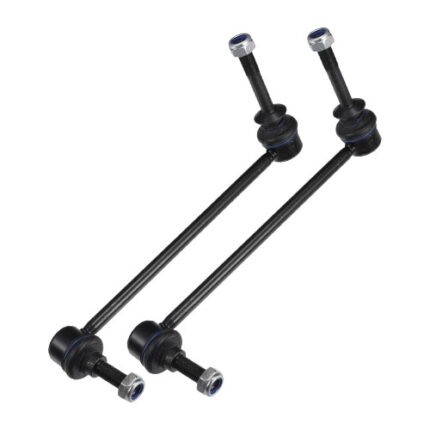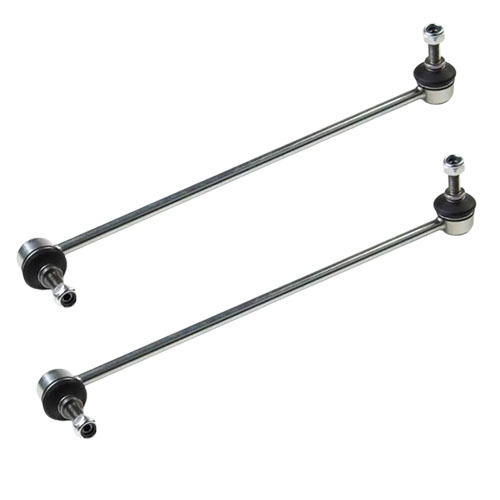-13%
Get BMW E92 335xi N55 3.0L Front Sway Bar End Link LH 31356768771 in Kenya
The front sway bar end link LH (left-hand) is an essential part of a vehicle’s suspension system, designed to enhance stability and control. While it is a relatively small component, its role in maintaining balance and mitigating body roll during driving is significant. This detailed guide will explore the functionality, structure, benefits, common issues, maintenance, and replacement of the front sway bar end link LH, offering a comprehensive understanding of its importance.
What Is a Front Sway Bar End Link?
The sway bar end link connects the sway bar (also known as the stabilizer bar or anti-roll bar) to the vehicle’s suspension. The sway bar itself is a metal rod running across the vehicle’s underside, linking the suspension on one side to the suspension on the other. The end link acts as the intermediary that transmits forces between the sway bar and the suspension system.
Purpose
The main purpose of the sway bar end link is to:
- Reduce body roll when cornering or maneuvering.
- Ensure even weight distribution across the tires.
- Provide a smoother, more controlled driving experience.
The left-hand (LH) end link specifically works on the driver’s side of the vehicle, operating in tandem with its counterpart on the right side.
Components and Design of the Sway Bar End Link
The sway bar end link is composed of several key elements:
- Rod or Shaft:
- Made of steel, aluminum, or composite materials for durability.
- Links the sway bar to the suspension system.
- Ball Joints:
- Located at both ends of the link to allow for pivoting motion.
- Enables the suspension to move independently while keeping the sway bar connected.
- Bushings:
- Typically made of rubber or polyurethane.
- Act as dampers, absorbing vibrations and reducing noise.
- Fasteners:
- Bolts and nuts that secure the link to the suspension and sway bar.
- Often treated with anti-corrosion coatings to withstand environmental exposure.
How the Front Sway Bar End Link LH Works
When a vehicle makes a turn, the outer wheels experience greater force than the inner wheels. This imbalance causes the vehicle body to lean or roll toward the outer side of the turn. The sway bar, connected to both sides of the suspension via the end links, counteracts this movement by redistributing the force from one side to the other.
The end link transmits these forces from the sway bar to the suspension, ensuring that both sides of the vehicle remain balanced and stable.
Benefits of the Front Sway Bar End Link LH
- Improved Stability:
The end link minimizes body roll, ensuring the vehicle remains level and balanced during turns. - Enhanced Handling:
By maintaining contact between the tires and the road, the end link contributes to precise steering and better control. - Reduced Wear on Suspension Components:
Proper force distribution prevents excessive strain on individual parts of the suspension system. - Increased Passenger Comfort:
Reduces the side-to-side movement of the vehicle, providing a smoother ride for occupants. - Safety:
Helps the vehicle maintain traction during sharp turns or evasive maneuvers, reducing the risk of rollover.
Signs of a Failing Front Sway Bar End Link LH
Over time, the sway bar end link may wear out or fail due to age, use, or external damage. Common symptoms of a failing end link include:
- Clunking or Rattling Noises:
Loose or worn components may produce noise, especially when driving over bumps or taking sharp turns. - Increased Body Roll:
The vehicle may feel less stable during cornering, with noticeable leaning. - Poor Steering Response:
Difficulty maintaining control during turns or sudden maneuvers. - Uneven Tire Wear:
Improper force distribution can lead to accelerated wear on specific tires. - Visible Damage:
Cracks, corrosion, or worn-out bushings can be identified during inspection.
Common Causes of Wear and Tear
- Environmental Exposure:
Water, salt, and road debris can corrode metal components and degrade rubber bushings. - Heavy Loads:
Overloading the vehicle increases stress on the suspension system, including the sway bar end links. - Frequent Off-Road Driving:
Uneven terrain and rough conditions accelerate wear and tear. - Aging:
Regular use over time leads to natural deterioration of the components.
Maintenance of the Front Sway Bar End Link LH
Proper maintenance ensures the longevity and performance of the sway bar end link.
Regular Inspection:
- Check for signs of wear, corrosion, or looseness during routine maintenance.
- Inspect the bushings for cracks or deformation.
Lubrication:
- Apply appropriate grease to the ball joints and bushings if recommended by the manufacturer.
Cleaning:
- Remove dirt and debris from the end link and surrounding areas to prevent corrosion.
Replacing a Front Sway Bar End Link LH
When the end link is damaged or excessively worn, replacement is necessary to restore vehicle stability.
Tools Required:
- Jack and jack stands
- Wrenches or socket set
- Penetrating oil
- Torque wrench
Steps to Replace:
- Lift the Vehicle:
Safely elevate the vehicle using a jack and secure it on stands. - Locate the End Link:
Identify the left-hand end link connecting the sway bar to the suspension. - Remove the Old End Link:
- Apply penetrating oil to rusted bolts if necessary.
- Loosen and remove the fasteners using a wrench or socket.
- Install the New End Link:
- Align the new end link with the sway bar and suspension mount.
- Secure it with the provided bolts, tightening them to the manufacturer’s specified torque.
- Check Alignment:
Verify that the new link is properly aligned and securely fastened. - Test Drive:
Take a short drive to ensure the replacement has resolved the issue and the vehicle handles as expected.
Upgrades and Alternatives
For performance enthusiasts or off-road drivers, aftermarket sway bar end links offer:
- Adjustable Lengths:
Ideal for customized suspension setups. - Heavy-Duty Materials:
Enhanced durability for extreme conditions. - Polyurethane Bushings:
Longer-lasting and more resistant to wear than rubber.
Environmental Considerations
Dispose of old sway bar end links responsibly. Recycle metal components and bushings where possible to reduce environmental impact.
Conclusion
The front sway bar end link LH is a small but vital component that plays a crucial role in a vehicle’s stability, handling, and safety. Understanding its function, recognizing signs of wear, and maintaining it properly can prevent costly repairs and enhance driving comfort. For drivers seeking peak performance, quality replacements or upgrades ensure the suspension system operates efficiently under various conditions. By prioritizing the care and maintenance of this essential part, you can enjoy a smoother, safer, and more reliable driving experience.
Follow us on Facebook for more parts.




Reviews
Clear filtersThere are no reviews yet.